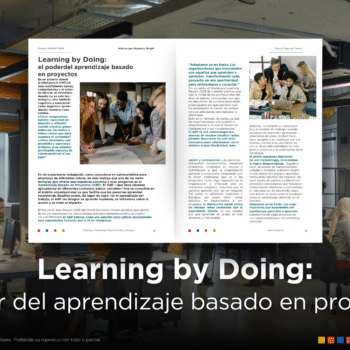Imagine a person with a «High D» DISC behavioral profile, characterized by being direct, results-oriented, and prone to making quick decisions. Now ask yourself: How will they perform at work if they also have high emotional intelligence?
A person with a «High D» and high emotional intelligence will know how to balance their direct, resolution-focused approach with empathy, understanding when to be more diplomatic in a meeting or how to handle a conflict without creating friction. On the other hand, someone with this style and low emotional intelligence could be perceived as insensitive or extremely impatient, which may lead to issues within the team or decision-making process.
A person with high emotional intelligence is aware of their emotions, regulates them, demonstrates empathy, and maintains good relationships with others. However, if we only consider their emotional intelligence without taking into account their DISC behavioral profile, we may overlook how they apply these skills in different situations. For example, someone with a «High S» DISC profile will be much more inclined to prioritize harmony due to their relational focus. Their emotional intelligence will help them remain calm, but they will handle challenging situations differently than a «High D,» even if both have developed emotional competencies.
In today’s workplace, where human interactions and conflict resolution are crucial, developing emotional intelligence (EQ) in conjunction with assessing behaviors like DISC provides a comprehensive view of an employee’s potential and areas for improvement. This is precisely what the Behavioral Intelligence assessment by TTI Success Insights, a global leader in talent assessment for over 40 years, measures—offering insights into behavior in the workplace.

The 4 DISC Dimensions from TTI Success Insights
Not all DISC assessments are the same. Let’s delve into how this validated measurement of behaviors is a foundational pillar of Behavioral Intelligence. DISC measures people’s behavioral preferences across four key dimensions:
- Dominance (D): This represents how a person approaches problems and challenges. Individuals with a high «D» are direct, competitive, and like to make quick decisions. However, low emotional intelligence in this profile can lead to being seen as too aggressive or overbearing.
- Influence (I): This refers to how people interact and communicate with others. High «I» profiles are extroverted, sociable, and enthusiastic. With high emotional intelligence, they can motivate and inspire others. With low EQ, their enthusiasm can come across as overwhelming or even manipulative.
- Steadiness (S): This factor measures a person’s preference for consistency and collaboration. A high «S» profile tends to be patient, loyal, and a great team player. However, without good emotional intelligence development, they may avoid conflict and struggle with stress.
- Compliance (C): This measures the focus on procedures and standards. People with high «C» are analytical, meticulous, and often prefer to follow rules. With low EQ, they can become inflexible or overly critical. With high EQ, they can be detail-oriented without creating a tense or restrictive work environment.
The 5 Dimensions of Emotional Intelligence (EQ) from TTI Success Insights
Combining the DISC profile with the five dimensions of emotional intelligence gives us a more complete picture of human behavior in the workplace:
- Emotional Self-Awareness: This is the ability to recognize and understand your own emotions. Individuals with high emotional self-awareness know how their behaviors impact others. For instance, a high «D» profile aware of their impatience can take steps to manage it during stressful situations.
- Emotional Regulation: The ability to control your emotions, especially in difficult situations. A person with high «I» and good emotional regulation can remain calm and motivated in crises, while poor regulation may lead them to become impulsive or reactive.
- Social Awareness: This aspect of EQ includes empathy and the ability to read others’ emotions. It’s crucial for collaboration and understanding team dynamics. A high «S» profile with low social awareness might miss important cues that a colleague is frustrated or unhappy, even though their behavioral preference is social.
- Social Regulation: This refers to the ability to manage and maintain healthy relationships and positively influence others. It’s essential for any leader aiming to motivate and connect with others. For example, a leader with high «I» and strong relationship management skills knows how to inspire without being manipulative.
- Self-Motivation: This is the ability to motivate oneself to achieve goals. A high «C» profile with strong personal motivation will seek to meet quality standards efficiently and meticulously. With low self-motivation, they may become too perfectionistic, losing sight of deadlines or productivity.
Why Is It Important to Assess Both Aspects in the Workplace?
The DISC profile gives you a clear view of how a person prefers to act in different situations, while emotional intelligence helps you understand how they apply that behavior depending on their level of emotional development.
In a work environment where interactions and emotions play as important a role as technical skills, measuring the development of emotional intelligence alongside the DISC behavioral profile is key to optimizing performance and improving team dynamics. By developing both aspects, leaders and employees can not only better understand their strengths and areas for improvement but also how to adapt and respond to the emotional and social demands of their work environment.
Is your team prepared to manage their emotions and maximize their potential in the workplace? I invite you to explore the Behavioral Intelligence assessment and how to apply it to your leadership. Let’s talk: https://calendly.com/alejandrawright/wright.
For more information about the Behavioral Intelligence assessment, visit TTI SUCCESS INSIGHTS CHILE
TTI Success Insights applies a multi-science approach to an ever-evolving suite of tools that support the employee journey. This commitment to continual improvement aligns with the American Psychological Association’s (APA) philosophy and methodology for assessment development, implementation, and validation.







